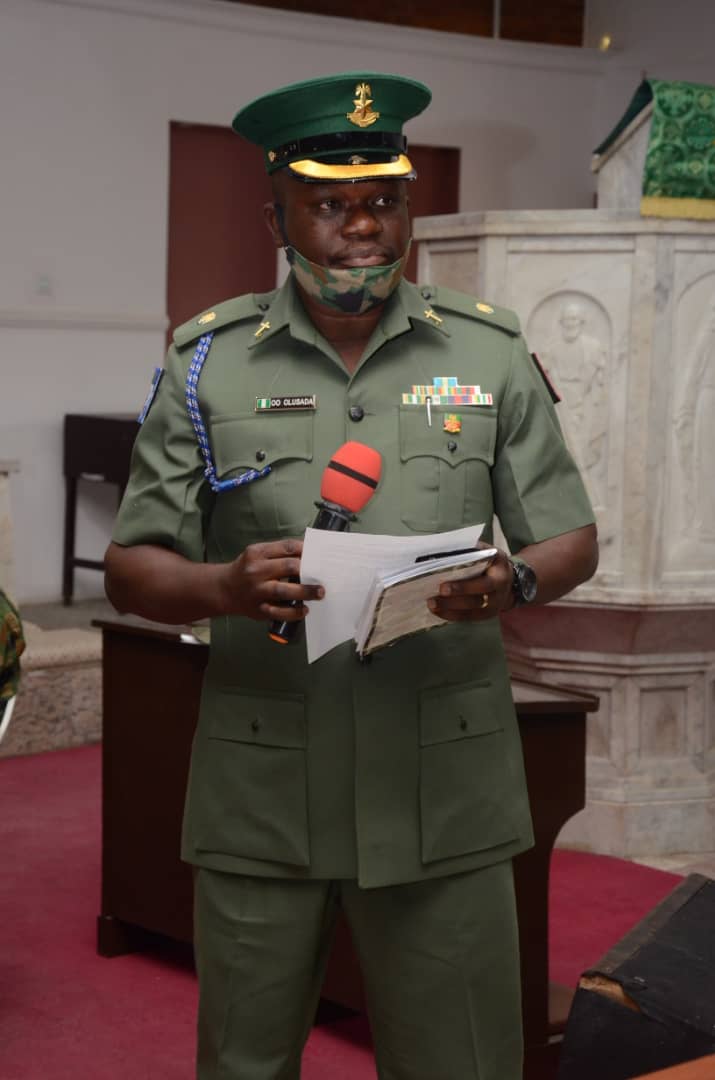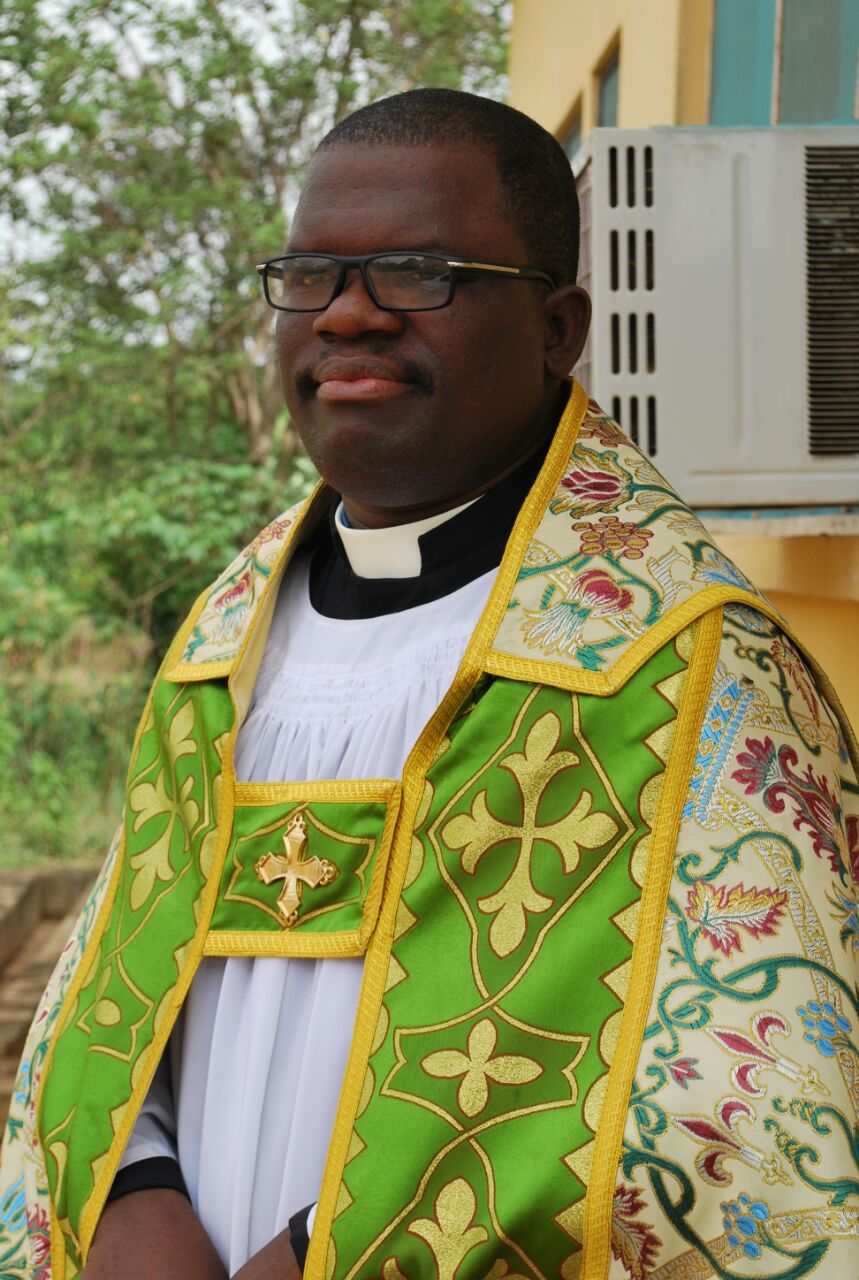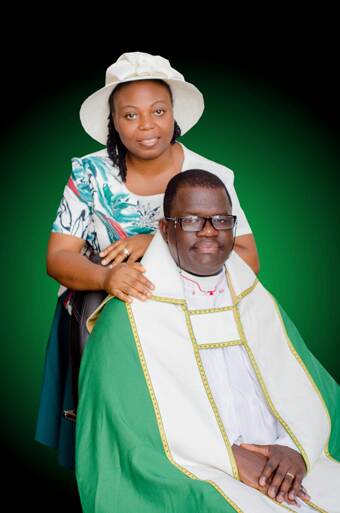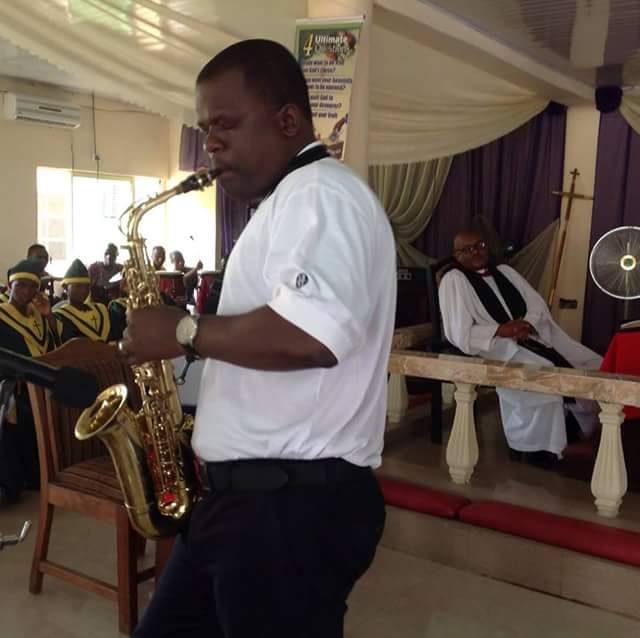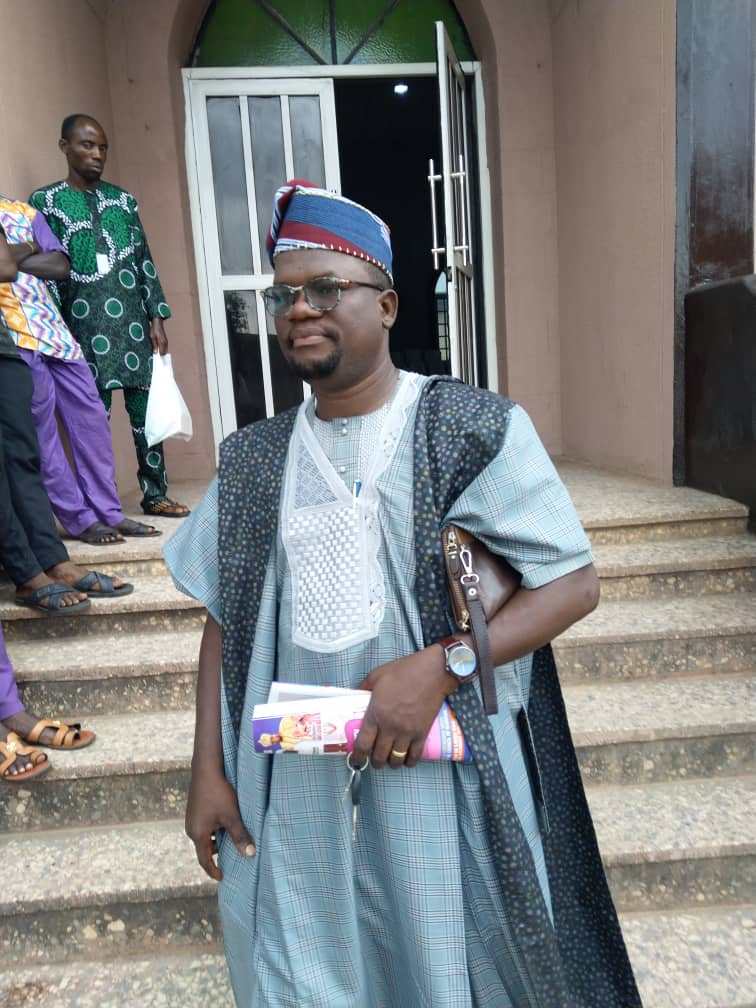Maj. (Ven.) Olufemi O. Olusada Ph.D. currently serves as a Senior Instructor in Nigerian Army Chaplain Training School Protestant.
Before now, he had served in some parts of the country as Nigerian Army Chaplain which includes: Chaplain & Vicar of the Prot Church in 195 Bn, Agenebode, Edo State. Chaplain & Vicar of the Prot Church in 20Bn Sarti Barua, Taraba State.
Major Olusada was Chaplain & Vicar of the Prot Church in ECC, Ede, Osun State. Also as 2i/c 2Div. Hq., Ibadan. Bde Chaplain & Vicar in 7Bde MNJTF, Baga, Borno State.
He was Chaplain & Vicar of the Protestant Church 81 Div Garrison, Obalende, Lagos. Demo Chaplain & Vicar of the Hq Demo Church, St Luke’s, Yaba, Lagos. He was also Chaplain & Vicar of St Bartholomew’s Mil Church, 221 Bn. New Bussa, Niger State.
Olusada served in foreign missions and operations specifically at the NIBAT 38, United Nations Peacekeeping in El-Dein, Sudan.
One of the hottest spots where he served was the 7Bde MNJTF, Baga in Borno State in the heart of the fight against Boko Haram.
In this interview with Church Times, he shares his experiences on the war front and how challenging it is to pastor Soldiers and their families as a Presidential Commission Officer.
You were a Priest in the Anglican Church before you joined the Army. What informed that decision?
Joining the Army has been my lifetime ambition. Many who knew me when I was younger would tell you I had this military trait in me. I am an endowed military-minded person by God’s grace. Foundationally, I was an active young boy in the 40th Ijebu Company Boys Brigade of the St. Mary Anglican Church, Ijebu-Imusin, Ogun State.
The man God used for us then was Rtd. Maj. Gen. T.B. Ogundeko – (of blessed memory.) He used his military influence to get Soldiers to train us in brigade music and drill parade.
It was hard to find such training among other brigade companies in Ogun State. The kind of military orientation I had in the brigade stands as an additional encouraging mechanism to me. I really don’t think many are surprised that I am in the military because of my early days’ involvement in the School Red Cross Society, Boys Brigade, and in Sporting Activities.
So it didn’t occur to you to be a Doctor as many would want to be or an Engineer?
Joining the Army was strong in my spirit. I never thought of becoming any other thing apart from being military personnel. I probably would have wanted to be a Scientist or go into academics as a Lecturer. Those were the professions I would have nursed within me while growing up.
But then, I just did not want to go into any of those professions. Even when my father who was a well-known Surveyor in the Ijebu zone, wanted me to be one, he did not succeed. Initially, he did get me admission into the Federal School of Surveying, Oyo State when his friend Mr. Ogunbayode was the Rector then. But I did not yield to his pressure as l opted out thereafter.
But you ended up being a priest before joining the military. How did becoming a priest come into play?
While I was at the Ogun State University, (now OOU) as a Pre-degree student I had an encounter with Jesus on the 3rd of June 1995. But while growing up in Christ l had a ‘significant dream encounter during which the Lord himself called me to the work of ministry. That was in 1998. That was what propelled me into the ordained ministry. However, I joined the military after I had been ordained as a Priest. I was already a statutory Canon in the Anglican when I joined the Army.
How did your encounter with Jesus happen?
Well, I surrendered my life to Jesus under the ministry of the then Ordinard Williams Mehinsan who came to my home Church as a Seminarian, on College Mission. He was a final year student at Emmanuel College, Ibadan. I came home from school that weekend as usual of me and was the one who interpreted for him while he preached.
He was a vibrant young man with so much passion for winning souls. After he finished preaching that day he made an altar – call for those who wanted to give their lives to Christ. I immediately dropped the microphone as he made the call and stepped out to say the sinner’s prayers.
But he quickly beckoned on me to continue interpreting for him and that he would attend to me after the programme. He was taken aback that his interpreter had not given his life to Jesus, despite being the leader of the youths in the church. He thought I ought to have been born again. But the truth is that l was just religious. I never heard the salvation message the way he preached that day the 3rd of June 1995. The then Ordinand Mehinsan is currently a Senior Venerable in the Anglican Church today to the glory of God.
So I had to give Jesus my life that day after he had finished preaching. And he did follow me up with several letters and so on. That was the beginning of my journey in the Lord to the glory of God.
So the Lord called you into priesthood first?
Oh Yes, as earlier narrated, l had a dream encounter in 1998 that informed my love for God and the calling to serve Him more. Hence, I did forfeit every other ambition to pursue theological education at the Archbishop Vining College of Theology, Akure after due process. Of a truth, it was amazing and somehow embarrassing that I did abandon my university degree for a theological seminary programme then. But today, I have every cause to thank God.
In the midst of all these, my ambition of going into the military remained fresh in me as grass by the water-side. After my theological training, I was posted to Ekiti West Diocese where I was ordained twenty years ago and served as Bishop Chaplain, Assistant Vicar, and Vicar in some Churches by God’s grace. Thereafter I sought admission to Obafemi Awolowo University where I bagged B. A (Hons) and M.A in Religion Studies by His grace.
So at what level did you quit priesthood for the military?
I won’t say I quit priesthood in that sense because I am still a priest of the Church of Nigeria Anglican Communion seconded to serve ecclesiastically in the Nigerian Army. While nursing my military ambition. I told my Bishop (Rt Rev’d S.O. Oke) that I would love to step aside from the civil ministry to attend the military school/training so as to thereafter serve as a Chaplain in the Army. My Bishop was taken aback because I am one of his darling sons in the Lord and committed and close staff.
Well, l humbly narrated to him how it has been my long-time ambition to join the military. I later got his approval and recommendation. So I purchased the Direct Short Service Commission form in 2009 being a graduate already, the training took nine months and l got presidential commissioning thereafter.
How was the military training?
That alone should be for a separate interview because It’s a world on its own. We were exposed to weird exercises and all kinds of drills. It was really tough. We had daily drills, obstacle crossing, training on mountains, rocks, visitation to different training locations, etc. It’s not something that can be captured in this interview as l earlier said. But then the Lord saw me through successfully.
I was commissioned as a Lieutenant at the Passing Out Parade from Nigeran Defence Academy, and after five years I was promoted to the rank of a Captain and after another five years, l was promoted to the rank of a Major to the glory of God.
As a Lieutenant, I was in Sudan for a peace-keeping mission for about one year. I had several encounters in Sudan supervising some of the sub-unit locations. It was an experience and God brought us back to Nigeria safely.
Did you have near-death experiences? And what is it about the military training that makes soldiers not care about life again?
Whoever God commissions, God is committed to keeping. I believe God has commissioned me to serve in the military. I am sure as the Lord lives, if my time is not up, God is committed to keeping me from the dangers of the day and night.
There have been encounters that would have taken my life and so many others. But God kept us. Here I am today to the glory of God. I came back from Sudan and I was transferred to Baga, Borno State to prosecute the Boko haram war from 2014 to 2016. Those seasons in Baga were seasons of grace.
As a priest in the fight against Boko Haram, I had to conduct burial for soldiers that died in the battle. My days in Baga were filled with horror. The deaths came suddenly for many officers. Some were going on a journey and they were ambushed by terrorists and killed.
The Multi-National Joint Task Force was located in Baga. By the time I got there, the catholic church and the protestant church were already burnt. But by the grace of God, the Lord used me to rebuild the chapels that were destroyed. Major General Salaam was the head of the NJTF. Though he is a Muslim he gave me all the support to rebuild the churches. To the glory of God, the churches are still standing today.
He saw that my presentation on the chapel was genuine and he gave all the support because he saw the sincerity of our purpose. When he saw how God used me to build the chapel, he asked me to build the regimental office too despite the fact that I was chaplain and not a trained builder. It was an additional task for me. God saw me through and the structure was put up. It is still standing today.
So how do you operate as a chaplain in the military?
The work of the chaplain as a trained soldier is to look after the spiritual well-being of the people. Our work is divided into two parts. We play the role of the chaplain during peacetime and also during wartime. There is no troop that will fight without their doctors and chaplains with them.
Can you share with us some of the cases of God’s intervention on the war front?
I have experienced many. We had ambushes but God saved us from being brought down. There were times we would be going in a row and the vehicles ahead of us would be consumed in a fight. But by the time our vehicles get there, we would escape miraculously.
There were many times we escaped from bombs planted on the roads that would have exploded on us. While in Borno, I was exposed to more danger than many others because of the job of rebuilding the church that was burnt. I was always on the road. And each time I moved out, there was the possibility of being killed. But God saved me.
When I finished the church buildings I thought it was time to rest. But my commander then gave me the task to rebuild the regimental office. In all, the Lord saw me through. The testimonies are endless.
So what scriptures do you engage with more while on the war front?
My favourite scriptures are Isaiah 45:2 “I will go before you and will level the mountains; I will break down gates of bronze and cut through bars of iron.” Psalm 91: 1ff “He who dwells in the secret place of the most high shall abide under the shadow of the Almighty….” Those two scriptures and many more come in handy while in battle. I believe God is committed to anyone he commissions as long as He still has need of him for the assignment.
How are your immediate family members taking your involvement with the military?
Basically, it is God who takes care of our families. We pray for them, they pray for us. When we are outside at the war front, we drop our signed cheque books. My wife is a medical doctor working with the Lagos State Government. She understands the nature of the job, and she is coping very well because we both rely on God and trust that He will always see us through.
But then, how is it like being the pastor of soldiers?
I think one of the strenuous tasks in the ministry is to minister to military people. Naturally, the army personnel are brave and strong-minded people. We dare anything. It is a big job to minister to people of such orientation. It is hard to pastor people who are specially trained to fight for the nation.
But then, we are human beings too and we have our own challenges and issues too. So, I would say God has been helping us to do the work and many families have been saved and restored. We have had to counsel and pray for many who have suffered one thing or the other. However, God’s grace has been so sufficient.
The chaplain helps to solve crises in the army through counseling and prayers. Sometimes we have had to intervene in cases like Soldiers who were about to be dismissed for certain offenses. We have had to plead on their behalf. We also have been able to manage traumatic cases
What would you consider the greatest challenge you have ever faced in the military?
My time in Baga was very challenging. It was the most traumatic period of my life. While there, I was not sure of the next day. We had to put our hope in God. You sleep in the night and don’t know who will wake up the next day. We wake up and we are not sure we will see the end of the day. At a time in Baga, I thought of writing my will because of the possibility of death. But then God gave me courage. So, there was no time I came to the war front and never thought of going back. Some of our colleagues could not stand the heat. They ran away from the war front.
Some people think life does not matter to the average soldier. How will you react to this?
Life matters to us. But then we have been conditioned to train our minds to prepare for eventualities. When you collect the NDA form, there is a do or die clause that you have to sign. The clause is that your family will never query the army if anything happened to you.
In some cases, parents don’t like signing such. So what some of us do is to look for a guardian who signs for us. In my case, my father was already late when I joined the army. My mum took it in good faith when I told her I was going to the military. She had a conviction that I won’t take the wrong step. So she believed all would be well.
On my part, there is no step that I take that I don’t back with prayers. When I collected the form, I went to a prayer mountain to pray for three days seeking the face of God. I told God if it was not His will, all efforts to get to the school should be frustrated. I sought for his leading. My decision to go to the military was not emotional. I pleaded with God to glorify himself. I said if my going to the military will not glorify him, he should stop me.
I had a challenge about my age at the beginning. I told myself I would never add one year to my year because I wanted to join the military. God eventually intervened. I knew becoming a pastor is not a ticket to heaven but living the life of God. I had known the Lord before going to the military so I was not ready to compromise my faith for ephemeral things.
How do you find a middle ground between your faith and your profession? For instance, if you have to kill on the war front and at the same time, you are thinking of the love of God for the soul?
The Bible in Ex 22:18 says, “suffer not the witch to exist.” Jesus also says in Matt. 15: 13 that any plant that God has not planted will be uprooted. In Matt. 7: 19 the Bible says, the fruit that does not bear good fruit must be cut away. There are souls in the physical and spiritual realms that should not be tolerated. The Bible calls believers soldiers of the Lord. The work of the soldier is to kill. That is where you appreciate churches like MFM that engage in warfare. The kingdom of darkness doesn’t negotiate, they go for the lives of people. That is my orientation in life. So I am able to find a middle ground between my faith and my profession.
But the Love of God does not allow us to be hard on our enemies?
You are to love. But it is the same love that sent the devil out of heaven. There was war in heaven. And the Bible says God’s will be done on earth as it is done in heaven. There are agents of darkness that will not allow God’s people to fulfill their destinies that should be eliminated.
There are many scriptures that give you no room to be lukewarm. As believers, we must understand that there are some souls that have signed not to change. So the believer is either consumed by them or the Lord consumes them. We have several instances of Bible warriors like David who did not spare the enemy.
Let’s talk about your interest in music
I grew up to love music. In the brigade, we do a lot of drumming and singing. There are a number of clips of my performance with saxophone. I compose and sing. I used to render solo during synods of some dioceses in the Anglican Church and also have a singing group too which I disciple. Singing is part of my ministry and a unique way I serve the Lord.
What has been the testimony of the people who come to know Jesus through your ministry?
God has used me to lead many to Christ in the military. I have served in many places across the country. I have served in Dodan Barrack, Obalende as a garrison chaplain and then St. Luke’s Military Church in Yaba and a number of other places. In all these places to the glory of God, I have led many to Christ. My sermon is always centred on Christ and the salvation of souls. I make altar calls and people come out to give their lives to Christ. There are many who come to seek the Lord during war. They see the efficacy of prayers and come bowing down to the Lord. It is God who saves and not man.
You recently bagged Doctor of Philosophy in Christian Theology (Ph.D.) What informed your research topic for the Ph.D. program?
It was my experience in Baga, Borno State that informed my Ph.D. thesis. With what I saw on the war front, I came to the conclusion that the place of the chaplain in the Nigerian Army cannot be underestimated.
I said to myself there is a need to put something down. I did my research project on The Role of the Nigerian Army Chaplain Services Protestant in Combating Terrorism (Boko Haram) in Maiduguri, Northeast, Nigeria.
What were your findings?
Ahh! That’s a separate work that can be addressed in another academic interview. But then we need to identify the problems of the studies first with a particular research methodology, before talking about the findings. Many have written about Boko Haram as a subject, but some of those who wrote on it, don’t have the field (internal) experience I have. I wrote the thesis from the direct insight angle. There are many things tied to the Boko Haram war. The chaplain plays a critical role in the fight against Boko Haram, He is directly involved and physically on the ground at the battlefield to conduct statutory services, advise Commanders, and counsel Officers and men as appropriate.
Also, the chaplain plays the role of counseling widows, orphans, and victims of war (wounded in action- WIA). It will amaze you that some soldiers might want to kill themselves because they would rather die rather than be killed by the enemy. So the chaplain has to do a lot of praying and counseling to give spiritual support to keep soldiers going both at the war front and during peace time.
Some soldiers are fighting at the war front and facing several troubles and challenges back at home with their wives, friends, or family members. There are different cases and issues that require both the physical and spiritual attention of someone who has spiritual insight.
For instance, it wouldn’t be out of place to have some Soldiers’ families or wives being disturbed by strangers or even friends while the Soldiers are away at the operation ground or war front. Some wives may also use the money meant for their families to take care of strangers and so on. Somehow the psychological involvement can not be overemphasized. These are some of the likely cases that may confront you as a military chaplain and you have to prayerfully address them as expected.
How is the sexual life of a soldier and his wife addressed since he may have to be on the war front while his wife is at home burning wanting to satisfy her sexual urge?
Well, l will like to answer you from two major perspectives. Fundamentally, military matters are restricted. But socially it involves other societal bodies or institutions that consist of the human being as social animals.
Firstly, the military system has the administrative provision for ‘Pass’ and ‘Leave’ to enable a personnel to travel to see his or her family locally or internationally.
Secondly, discipline and self-control cannot be underestimated in this regard. There is time for everything and I also know it takes God’s grace to stand without having your sexual urges being fed or satisfied in some situations. The background, spiritual orientations, and training we have constitute our state of mind at every point in time in life.
We cannot underestimate living a disciplined life in this regard. For instance what kind of urge should you be having while on the frontline of war? What constitute your thinking at that: point in time is more professionalism, and you can’t afford to be careless during war.
The Bible in 2 Tim. 2: 2&3 teach us to endure hardship and not to engage with worldly affairs while on the war-front. That is extremely indispensable. Every believer is a Soldier of the Lord. As a Pastor, you must be always ready for any posting and to face any task and challenges on your way.
Let me conclude by sharing the story l sometimes read of a man who was sad and crying bitterly for not being allowed by his Pastor to join others go for missions-tasks.
The man was said to have been an Armed Robber before he had a divine encounter and gave his life to Christ. As he was growing in the Lord, he saw people going on missions in a war zone and some other dangerous locations to preach the gospel.
Hence, he met his Pastor (who happened to be Bro Gbile Akanni’s father ) and did complain that nobody thought of him when it comes to missions. He wondered why he was not been considered to join them risk his life for Christ’s missions?
His Pastor replied and said: that he was not considered because he was the only child left for his aged mother and they would not want his mother to lose him and be sorrowful. He added that those on the field could face possible death and they don’t want his mother to weep over him.
This man suddenly started weeping bitterly and asked: “Who was taking care of my mother when l was an Armed robber?”
He added, “if l had died as an Armed Robber, would my mother not have survived?” This man became uncontrollable and requested that he should be allowed to go for the missions to sacrifice his life for the One who saved his life (if need be.)
This story made a lot of impact on me. Hence, services in life are all about sacrifices. To serve God is to serve humanity. We must ask ourselves this touching and thought-provoking question: Is our service to humanity sacrificial or only for our self benefits? Of a truth, to live impactful in life is sacrificial, and that is the essence of life.

